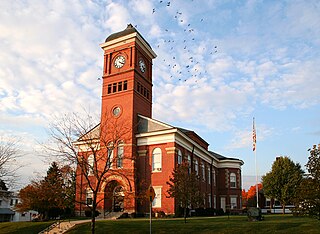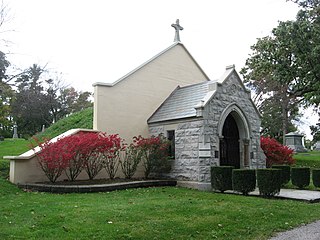
Warren Gamaliel Harding was an American politician who served as the 29th president of the United States from 1921 until his death in 1923. A member of the Republican Party, he was one of the most popular sitting U.S. presidents. After his death, a number of scandals were exposed, including Teapot Dome, as well as an extramarital affair with Nan Britton, which tarnished his reputation.

Morrow County is a county located in the central portion of the U.S. state of Ohio. As of the 2020 census, the population was 34,950. Its county seat is Mount Gilead. The county was organized in 1848 from parts of four neighboring counties and named for Jeremiah Morrow who was the Governor of Ohio from 1822 to 1826. Shawnee people used the area for hunting purposes before white settlers arrived in the early 19th century. Morrow County is included in the Columbus, OH Metropolitan Statistical Area. In 2010, the center of population of Ohio was located in Morrow County, near the village of Marengo.

Marion is a city in and the county seat of Marion County, Ohio, United States. It is located in north-central Ohio, approximately 50 miles (80 km) north of Columbus. The population was 35,999 at the 2020 census, down slightly from 36,837 at the 2010 census. It is the largest city in Marion County and the principal city of the Marion micropolitan area. It is also part of the larger Columbus–Marion–Zanesville, OH Combined Statistical Area.

Nanna Popham Britton was an American woman who gained notoriety as a mistress of Warren G. Harding, the 29th President of the United States. In 1927, she revealed that her daughter, Elizabeth, had been fathered by Harding while he was serving in the United States Senate, one year before his election to the presidency. Britton's claim was open to question during her lifetime, but in 2015, Harding's paternity was finally confirmed by DNA testing.

Florence Mabel Harding was the first lady of the United States from 1921 until her husband's death in 1923 as the wife of President Warren G. Harding.
The Marion Star is a newspaper in Marion, Ohio. The paper is owned by the Gannett Newspaper organization. The paper is also notable as having once been owned and published by Warren G. Harding, and his wife Florence Kling Harding.

Charles Elmer Sawyer, was a homeopathic physician who was the longtime personal doctor to U.S. President Warren G. Harding and First Lady Florence Kling Harding. Sawyer is often blamed in the matter of Harding's death in 1923.

William Estabrook Chancellor was an American academic and writer. An opponent of the 1920 Republican presidential candidate, Warren G. Harding, Chancellor gained notoriety when he allegedly wrote a study of Harding's ancestry just prior to the election, asserting that Harding had an African-American ancestor. Chancellor denied authorship, and it has never been proved. Two years later, a biography of Harding was published under Chancellor's name, but Chancellor denied authorship of that as well.

The Harding Tomb is the burial location of the 29th President of the United States, Warren G. Harding and First Lady Florence Kling Harding. It is located in Marion, Ohio. Also known as the Harding Memorial, it was the last of the elaborate presidential tombs.

Elizabeth Ann Britton Harding Blaesing was the daughter of Warren G. Harding, the 29th president of the United States, and his mistress, Nan Britton. Harding and Britton, who both lived in Marion, Ohio, began their affair when he was a U.S. senator and it continued until his sudden death during his presidency in 1923.

The Harding Home is a historic house museum at 380 Mount Vernon Avenue in Marion, Ohio. It was the residence of Warren G. Harding, 29th president of the United States. Harding and his future wife, Florence, designed the Queen Anne Style house in 1890, a year before their marriage. They were married there and lived there for 30 years before his election to the presidency.

Grant Earl Mouser was a U.S. Representative from Ohio for two terms from 1905 to 1909.

Warren G. Harding's tenure as the 29th president of the United States lasted from March 4, 1921, until his death on August 2, 1923. Harding presided over the country in the aftermath of World War I. A Republican from Ohio, Harding held office during a period in American political history from the mid-1890s to 1932 that was generally dominated by his party. He died of an apparent heart attack and was succeeded by Vice President Calvin Coolidge.

The 1914 United States Senate election in Ohio was held on November 3, 1914. Republican nominee Warren G. Harding, future President of the United States, defeated Democratic nominee Timothy S. Hogan and Progressive Arthur L. Garford to succeed retiring incumbent Republican senator Theodore E. Burton.

The Marion Cemetery Receiving Vault is a funerary structure in the main cemetery of Marion, Ohio, United States. Constructed in the 1870s, this receiving vault originally fulfilled the normal purposes of such structures, but it gained prominence as the semipermanent resting place of Marion's most prominent citizen, U.S. President Warren G. Harding.
The Huber Building is a historic department store building in Marion, Ohio, United States. It was designed by Richards, McCarty & Bulford and constructed in 1903 by famed industrialist Edward Huber. The building contract was for $250,000. A 1909 image was taken from atop the building's elevator tower. Uhler Phillips Company, also known as Uhler's, operated a department store in the building for many years. It was owned by Carrie Fulton Phillips and her husband James Phillips, who left the company following a scandal that linked his wife with Warren G. Harding.
James David Robenalt is a Cleveland-based lawyer for the firm Thompson Hine LLP. He is the author of four books: Linking Rings, William W. Durbin, the Magic and Mystery of America (2004), The Harding Affair: Love and Espionage During the Great War (2009), January 1973, Watergate, Roe v. Wade, Vietnam, and the Month that Changed America Forever (2015), and Ballots and Bullets: Black Power Politics and Urban Guerrilla Warfare in 1968 Cleveland (2018).

The 1920 United States presidential election in Minnesota took place on November 2, 1920 as part of the 1920 United States presidential election in which all contemporary forty-eight states participated. Voters chose 12 electors, or representatives to the Electoral College, who voted for president and vice president. This election marks the last time a candidate for president won every county in Minnesota.
Ellen Walker Craig-Jones was an American politician. She was inducted into the Ohio Women's Hall of Fame for "Government and Military Service." She was the first African American woman to be elected mayor of a United States municipality in 1972. She served as mayor of Urbancrest, Ohio, from 1972 until 1975.















